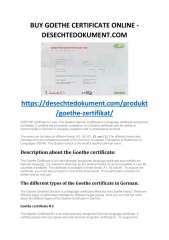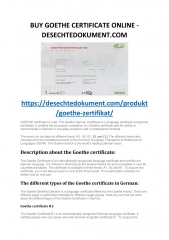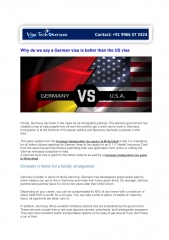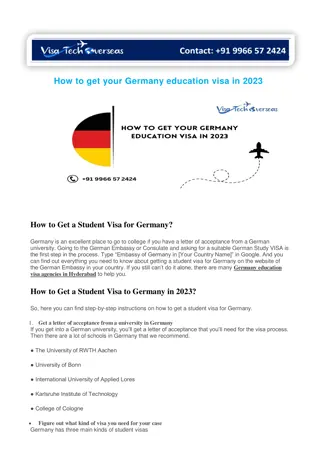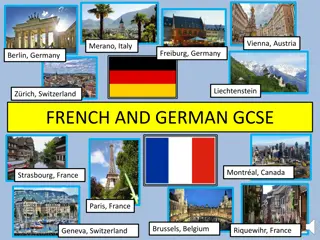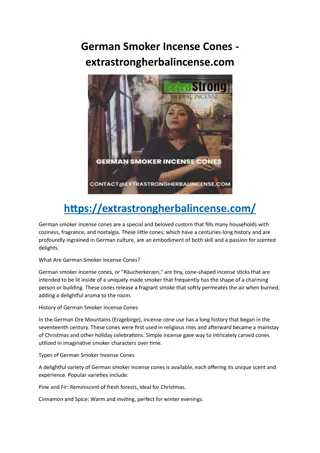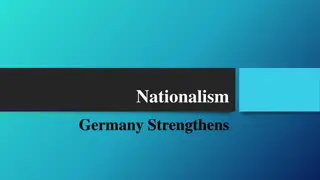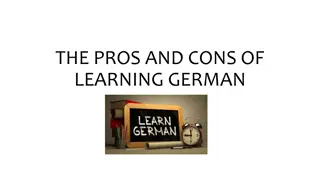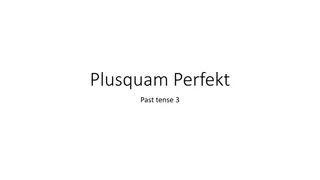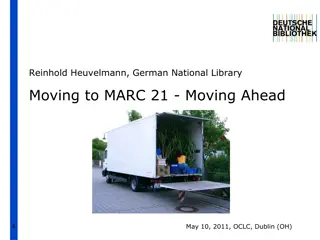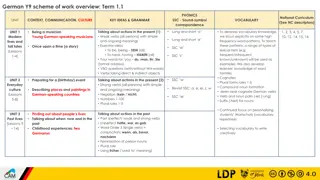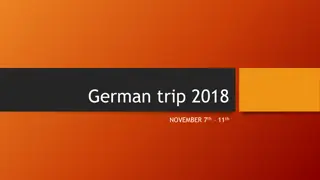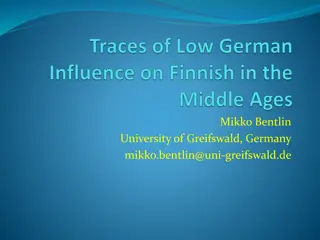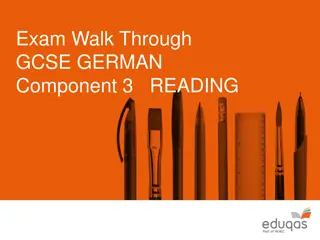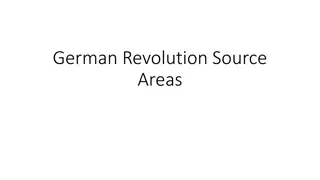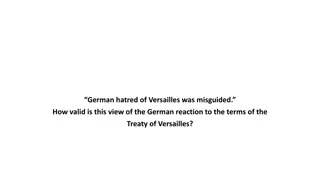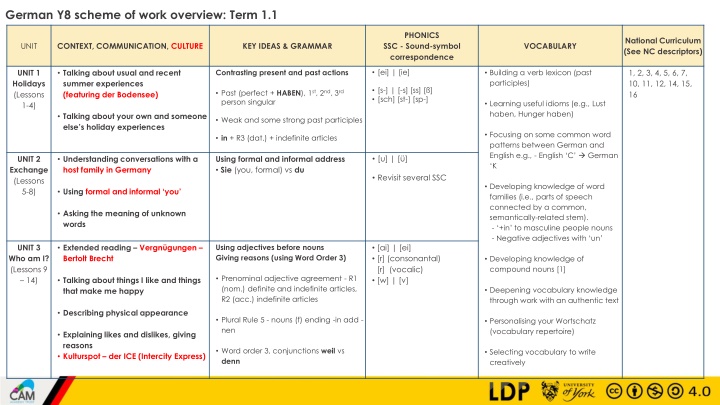
German Y8 Scheme of Work Overview
Explore the detailed scheme of work for German Y8, covering topics like phonics, communication, culture, grammar, and vocabulary. Dive into lessons on holidays, exchanges, personal identity, Berlin, past journeys, likes and dislikes, and more.
Download Presentation

Please find below an Image/Link to download the presentation.
The content on the website is provided AS IS for your information and personal use only. It may not be sold, licensed, or shared on other websites without obtaining consent from the author. If you encounter any issues during the download, it is possible that the publisher has removed the file from their server.
You are allowed to download the files provided on this website for personal or commercial use, subject to the condition that they are used lawfully. All files are the property of their respective owners.
The content on the website is provided AS IS for your information and personal use only. It may not be sold, licensed, or shared on other websites without obtaining consent from the author.
E N D
Presentation Transcript
German Y8 scheme of work overview: Term 1.1 PHONICS National Curriculum (See NC descriptors) SSC - Sound-symbol correspondence UNIT CONTEXT, COMMUNICATION, CULTURE KEY IDEAS & GRAMMAR VOCABULARY [ei] | [ie] UNIT 1 Holidays (Lessons 1-4) Talking about usual and recent summer experiences (featuring der Bodensee) Contrasting present and past actions Building a verb lexicon (past participles) 1, 2, 3, 4, 5, 6, 7, 10, 11, 12, 14, 15, 16 [s-] | [-s] [ss] [ ] [sch] [st-] [sp-] Past (perfect + HABEN), 1st, 2nd, 3rd person singular Learning useful idioms (e.g., Lust haben, Hunger haben) Talking about your own and someone else s holiday experiences Weak and some strong past participles Focusing on some common word patterns between German and English e.g., - English C German K in + R3 (dat.) + indefinite articles [u] | [ ] UNIT 2 Exchange (Lessons 5-8) Understanding conversations with a host family in Germany Using formal and informal address Sie (you, formal) vs du Revisit several SSC Developing knowledge of word families (i.e., parts of speech connected by a common, semantically-related stem). - +in to masculine people nouns - Negative adjectives with un Using formal and informal you Asking the meaning of unknown words UNIT 3 Who am I? (Lessons 9 14) Extended reading Vergn gungen Bertolt Brecht Using adjectives before nouns Giving reasons (using Word Order 3) [ai] | [ei] [r] (consonantal) [r] (vocalic) [w] | [v] Developing knowledge of compound nouns [1] Prenominal adjective agreement - R1 (nom.) definite and indefinite articles, R2 (acc.) indefinite articles Talking about things I like and things that make me happy Deepening vocabulary knowledge through work with an authentic text Describing physical appearance Plural Rule 5 - nouns (f) ending -in add - nen Personalising your Wortschatz (vocabulary repertoire) Explaining likes and dislikes, giving reasons Kulturspot der ICE (Intercity Express) Word order 3, conjunctions weil vs denn Selecting vocabulary to write creatively
German Y8 scheme of work overview: Term 1.2 PHONICS CONTEXT, COMMUNICATION, CULTURE National Curriculum (See NC descriptors) SSC - Sound-symbol correspondence UNIT KEY IDEAS & GRAMMAR VOCABULARY UNIT 4 Berlin (Lessons 15 - 18) Talking about features of Berlin Using numbers 32 100 Talking about what we did on a visit to Berlin Referring back to it , them , me , you Contrasting present and past [2] [z] (-tion) - English C German Z -tion cognates 1, 2, 3, 4, 5, 7, 10, 11, 12, 14, 16 [ch] (hard) | [ch] (soft) Object pronouns (mich, dich, ihn, sie, es) nicht vs nichts, numbers 32 100 Present vs Past (perfect - weak verbs), 1st persons singular and plural von + R3 (dat.) um + [number] + Uhr (simple time) Contrasting actions in the past [2] Nominalisation of verbs (e.g. das Schwimmen) Noun and verb pairs [1] (verb stem = noun) [2] (-ung nouns and matching verbs) UNIT 5 Past journeys (Lessons 19 22) Talking about where you went, how you got there and what you did (focus on Krakow, Poland) Talking about your and someone else s recent journey (focus on der Schwarzwald) Talking about things you like doing Talking about when and how you do things (focus on der Wurstelprater theme park in Wien) Talking about preparing for a birthday party (Kulturspot: das internationale Ballonfestival in der Schweiz) long [a] [o] | short [a] [o] Building the verb lexicon: separable verbs, three verbs to put Past (perfect + HABEN vs SEIN) mit + R3 (dat.), an + R2 (acc.), R3 (dat.), durch + R2 (acc.), f r + R2 (acc.) Word order: manner (M) before place (P) [er-] | [-er] UNIT 6 Likes and dislikes (Lessons 23 26) Talking about how you do and how well you like doing things (using gern and other adverbs) [a] | [ ] [g-] | [-g] Present tense + adverb gern UNIT 7 A party (Lessons 27 28) Using present tense separable verbs Present tense separable verbs Three verbs to put : stellen, setzen, legen Conjunction w hrend (WO3) [o] | [ ]
German Y8 scheme of work overview: Term 2.1 PHONICS CONTEXT, COMMUNICATION, CULTURE National Curriculum (See NC descriptors) SSC - Sound-symbol correspondence long [i] | short [i] UNIT KEY IDEAS & GRAMMAR VOCABULARY UNIT 8 Family and friends (Lessons 29 32) Talking about exchanging gifts Giving reactions and opinions (using verbs with indirect objects) Nominalisation of verbs 1, 2, 3, 4, 5, 7, 10, 11, 12, 14, 16 long [i] | [ie] (known words) Giving reactions and opinions about life in school English -ical German -isch Verbs with indirect objects (mir, dir, ihm, ihr) f r + R2 (acc.), von + R3 (dat.) Possessives mein/dein +R2 (acc.), +R3 (dat.) Verbs of opinion (denken, glauben, meinen) Conjunction dass + Word order 3 [ei] | [ie] [2] UNIT 9 New Talking about things you and others have done (focus on Salzburg) Talking about actions and events in the past Revisit past (perfect) tense Revisit [a] [ ] [o] [ ] [u] [ ] experiences (Lessons 33 34) revisit all SSC UNIT 10 Now and then (Lessons 35 38) and cont d in Term 2.2 Comparing places and people now and then ( sterreich Innsbruck, Wien, Salzburg; Schweiz; Deutschland Bad, Hersfeld) Talking about what you did and what you used to do Comparing now and then Imperfect tense (war, hatte, es gab) Comparative adjectives, als meaning than [zw] | [schw]
German Y8 scheme of work overview: Term 2.2 PHONICS CONTEXT, COMMUNICATION, CULTURE National Curriculum (See NC descriptors) SSC - Sound-symbol correspondence UNIT KEY IDEAS & GRAMMAR VOCABULARY [-e] | [-er] (adjective or comparative adjective) UNIT 10 Now and then (cont d.) (Lessons 39- 40) Extended reading Fr her (Wise Guys) Comparing now and then Deepening vocabulary knowledge through work with an authentic text 1, 2, 3, 4, 5, 6, 7, 10, 11, 12, 14, 16 Plural rule 5 (-s) Personalising your Wortschatz (vocabulary repertoire) Selecting vocabulary to write creatively Revisit several SSC UNIT 11 What we like and prefer doing (Lessons 41- 44) Talking about everyday life experiences Talking about what we like and prefer doing Talking about what we like and prefer doing [z] vs [s] Nominalisation of adjectives English -ty/-ness German -heit Present tense separable verbs: 1stand 3rdpersons plural Present tense + gern, + lieber statt + zu + infinitive Possessive adjectives unser, ihr Pronouns uns, ihnen [st-] [sp-] - | [sch] [2] [er-] | [-er] [2] UNIT 12 This year or last year? (Lessons 45 48) Talking about this year and last year s experiences in school Focus on Schule in Deutschland Contrasting what you did in the past and what you have been doing and still do Contrasting past and current actions seit + present tense (past meaning) vor + ago + perfect tense [e] | [ ]
German Y8 scheme of work overview: Term 3.1 PHONICS CONTEXT, COMMUNICATION, CULTURE National Curriculum (See NC descriptors) SSC - Sound-symbol correspondence UNIT KEY IDEAS & GRAMMAR VOCABULARY [ch] [ck] UNIT 13 In the news (Lessons 49 50) Understanding an adapted- authentic non-fiction text Talking about where things are or are moving to an vs auf R2 (acc.) and R3 (dat.) Deepening vocabulary knowledge through work with an authentic text 1, 2, 3, 4, 5, 6, 7, 10, 11, 12, 14, 16 Personalising your Wortschatz (vocabulary repertoire) [d-] [-d] UNIT 14 Making plans (Lessons 51 56) Talking about plans for this weekend Talking about what people should do Talking about plans for a boat trip (featuring der Bodensee) Talking about what we are going to do, should do, will and want to do Selecting vocabulary to write creatively [pf] [kn] Present tense (present and future meaning) Modal verbs (K NNEN, D RFEN, WOLLEN, SOLLEN) Future tense (WERDEN + infinitive) vs WOLLEN 1st, 2nd, 3rdpersons singular - English -ght German -cht - Word family Freund Noun and verb pairs [3]: verb stem = noun, verb stem +e = noun Haupt- prefix [eu] | [ u] (known words) Describing attributes UNIT 15 New home (Lessons 57 60) Describing a new house Talking about new neighbours Asking and answering questions -weise and adverbs [f] | [v] (known words) [v] | [w] [2] (unknown words) Prenominal adjective agreement R1 (nom.), R2 (acc.) with definite articles Adjective agreement with definite and indefinite articles after mit & aus + R3 (dat.)
German Y8 scheme of work overview: Term 3.2 PHONICS CONTEXT, COMMUNICATION, CULTURE National Curriculum (See NC descriptors) SSC - Sound-symbol correspondence [y] [u] | [ ] long and short vowels [ei] [ie] colloquial intensifiers UNIT KEY IDEAS & GRAMMAR VOCABULARY Talking about past events UNIT 16 Past events (Lessons 61 64) Saying what people did and when (Sylt) (Kulturspot: Greetings in Germany, Switzerland and Austria) Deepening vocabulary knowledge through work with an authentic text 1, 2, 3, 4, 5, 6, 7, 10, 11, 12, 14, 16 Past (perfect + HABEN / SEIN), imperfect Pronouns du, man, Sie Time with halb, nach, vor Personalising your Wortschatz (vocabulary repertoire) Asking and answering questions about events at a music festival Selecting vocabulary to write creatively revisit isch adjectives [sch] [ch] Revisit several SSC Fluency development UNIT 17 Erlk nig (Goethe) (Lessons 65 66) UNIT 18 My plans (Lessons 67 72) Extended reading Erlk nig (Goethe) Understanding and responding to a literary text English -(al)ly German -lich SSC written differently but sounding the same Talking about future plans Talking about plans (Der Ball der Tiere | Siddharta Hermann Hesse) Asking and answering when questions Understanding adapted- authentic non-fiction texts about young people s aspirations Talking about what s important to you (Adapted-authentic text 10 Tipps f r ein gl ckliches Leben) Future tense (WERDEN + infinitive) vs WOLLEN 1st, 2nd, 3rdpersons singular Conjunction wenn + Word order 3 aus + R3 (dat.) meaning from Pronouns: subject R1, object R2 and indefinite object R3 [ei] | [ie] Fluency development
KS3 Languages National Curriculum and Knowledge strands matrix National Curriculum objectives Pupils should be taught to: NC no. Knowledge Strands Modes and modalities Recognition & Production (Sound to print L & W) Recognition & Production (Print to sound R & S) transcribe words and short sentences that they hear with increasing accuracy. 1 Phonics speak coherently and confidently, with increasingly accurate pronunciation and intonation. 2 3 4 listen to a variety of forms of spoken language to obtain information and respond appropriately. read and show comprehension of original and adapted materials from a range of different sources, understanding the purpose, important ideas and details, and provide an accurate English translation of short, suitable material. read literary texts in the language [such as stories, songs, poems and letters], to stimulate ideas, develop creative expression and expand understanding of the language and culture. initiate and develop conversations, coping with unfamiliar language and unexpected responses, making use of important social conventions such as formal modes of address develop and use a wide-ranging and deepening vocabulary that goes beyond their immediate needs and interests, allowing them to give and justify opinions and take part in discussion about wider issues identify and use tenses or other structures which convey the present, past, and future as appropriate to the language being studied. use and manipulate a variety of key grammatical structures and patterns, including voices and moods, as appropriate. Understanding (Aural (L) / Written (R)) Vocabulary 5 6 7 Production 8 (Oral (S) / Written (W)) 9 Understanding (Aural (L) / Written (R)) 10 11 identify and use tenses or other structures which convey the present, past, and future as appropriate to the language being studied. use and manipulate a variety of key grammatical structures and patterns, including voices and moods, as appropriate. express and develop ideas clearly and with increasing accuracy, both orally and in writing use accurate grammar, spelling and punctuation. write prose using an increasingly wide range of grammar and vocabulary, write creatively to express their own ideas and opinions, and translate short written text accurately into the foreign language. Grammar 12 Production 13 (Oral (S) / Written (W)) 14 15 16

